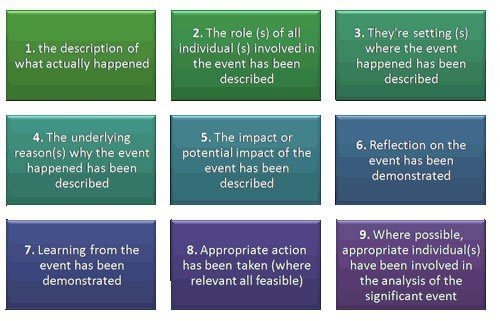Quality Improvement
Significant Event Analysis (SEA)
What are Significant Events?
The predecessor term to Significant Event Review was Critical Incident Analysis. This was a process to look at those negative outcomes which may have been triggered by negative events. The idea was based on the notion that if you could identify what were the causes which led to a bad undesirable outcome (for example, giving the wrong prescription to a patient) then you might be able to change things around to stop them happening in the future and thus improving patient safety and care.
The term was changed to significant event because sometimes you can get a really great outcome that was not anticipated. By reviewing the events which led to that “great” outcome might just be able to help you duplicate it and do it more often.
So, significant events can be good or bad outcomes. Significant Event Review is a process to help you look at such events to identify factors which might need changing or promoting with the ultimate aim of improving patient safety and care. Promoting patient safety has other ramifications: it protects the practice, its staff and the doctors too. In other words, everyone’s a winner.
The GMC says…
A significant event, also known as an untoward or critical incident, is any unintending or unexpected event, which could or did lead to harm of one or more patients. This includes incidents which did not cause harm but could have done, or where the event should have been prevented. All doctors as part of revalidation are required to record and reflect on significant events in their work with the focus on what you have learnt as a result of the events. Use non-identifiable patient data only.
Okay, I'm hooked. But how do I actually do one?
Be insightful and be on the look out for any events which on reflection you think need exploring in more detail eg a prescription being sent to the wrong patient, a home visit that was overlooked and thus no visit received (even though it might have been for a minor thing) etc. What you’re looking for are those events which although might not have resulted in a really bad outcome this time around, have the potential of turning out bad in the future if they are simply ignored. We call these “near-misses”.
- Try and fix any problems that have resulted now.
- Then use one of the “Significant Event Analysis Forms” in the QUICKLINKS section of this page. I prefer my version – RAM (1) because I think it is the most structured and comprehensive. It also teaches you about risk assessment.
- Once you’ve done that, take the whole thing and present it to the rest of the team to see what needs to be done in the future to stop this happening in the first place. You’ll get more opinions and ideas of ways in which you can change things if you take it back to the team. Then document the solution(s) the group has opted for.
- Recheck after a time period to make sure things are working smoothly or whether further fine tuning is necessary.
- The format we require is the STRUCTURED review template in the downloads section above (the same as the form used by GPs in their appraisals). This has the advantage that you will be familiar with what is being expected of GPs before some of them have started to use it.

What types of Significant Events should I focus on?
Significant Events can be about
- things that didn’t go well – to help you try and improve
- things that went surprisingly (and unexpectedly) well – to help you identify what made it work well and help you continue doing that in the future.
Significant Events don’t have to be about massively life changing events. They can be on smaller scale things like talking to the receptionist about a patient at the front desk in front of other patients or having a disagreement with one of the members of staff. Printing off a prescription for a patient but in the wrong patient record is another example. Going on a visit to the wrong patient. I could go on but I’ll stop there. P.S. read the diagram above


